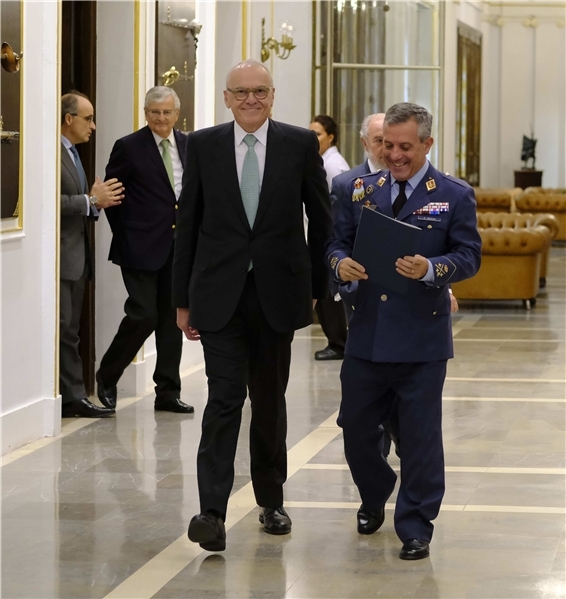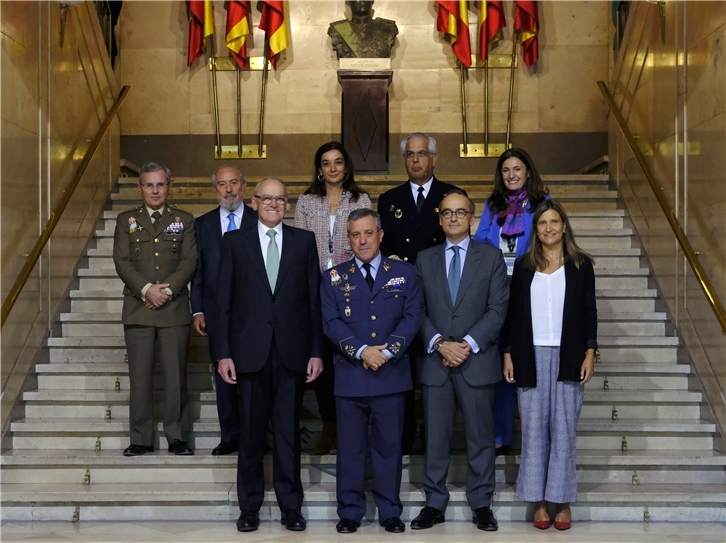News
Throughout the morning session, about fifteen experts discussed how to deal with the challenge from Public Administrations and companies
Iberdrola and CESEDEN analyse the challenges climate change poses for national defence
- The day on 'Climate change and security' was closed by the director of the Centre of Studies for National Defence, Rafael Sánchez Ortega, and the secretary of the Board of Directors of Iberdrola, Julián Martínez-Simancas
This morning, Iberdrola and the Centre of Studies for National Defence (CESEDEN), the main joint military training centre of the Spanish Armed Forces, held the Seminar on Armed Forces and Civil Society: .climate change and security
The opening of this day, at 9.00, was the responsibility of; Francisco José Dacoba Cerviño, brigadier general, director of the Spanish Institute of Strategic Studies and co-director of the seminar; Santiago Martínez Garrido, director of the Legal Services of Iberdrola; and Manuel Aragón Reyes, Professor of Constitutional Law at the UAM and co-director of the seminar.
During the latter, a group of 15 climate change experts analysed the harmful consequences of this serious problem for society and, in particular, for national defence, while also presenting the measures adopted by both Public Administrations and companies such as Iberdrola in order to mitigate such consequences.
Thus, in the first part of the seminar, entitled The challenges of climate change, Emilio Sánchez de Rojas, a graduate Colonel on the Army General Staff and a collaborator in the Spanish Institute for Strategic Studies, gave a speech: Climate Change, a fact of life. Then, Beatriz Yordi Aguirre, director of the European Commission’s European and International Carbon Markets, gave a presentation on how the EU is dealing with the problem.
After that came an explanation from Teresa Solana Méndez de Vigo, advisory member of the Spanish Office of Climate Change, of the measures promoted by Spain to combat the problem. Finally, María del Mar Hidalgo García, an analyst at the Spanish Institute for Strategic Studies, reported on The influence of climate change and environmental degradation on national security.
Combating climate change is everyone's job
The second part of the seminar witnessed the participation of Ignacio García Sánchez, a captain and analyst in the Spanish Institute of Strategic Studies, who, under the title,The Armed Forces and the company in the face of climate change, focused his presentation on climate change and the transformation of the Western Armed and Security Forces (FAS, its Spanish acronym). Afterwards, José Francisco Pérez-Ojeda y Pérez, Vice Admiral and General Director of Infrastructures of the Ministry of Defence, explained the measures adopted by the Ministry to fight against climate change.
Next, Lara Lázaro Touza, principal researcher on the Energy and Climate Change Programme at the Elcano Royal Institute, analysed The role of large companies in the face of climate change. Finally, Carlos Sallé, Iberdrola’s director of Energy Policy and Climate Change took up the challenge and emphasised the company’s firm and historic commitment to sustainable development, as well as its commitment to renewable energy.
The Seminar on the Armed Forces and Civil Society: climate change and security was closed, at around 2pm, by Rafael Sánchez Ortega, Lieutenant General of the Air Force and Director of CESEDEN, and the Secretary of the Board of Directors of Iberdrola, Julián Martínez-Simancas.
About CESEDEN
The Centre for National Defence Studies (CESEDEN) is the main joint military teaching centre of the Spanish Armed Forces. CESEDEN is responsible for the giving of courses on national defence studies, as well as for developing research and the promotion and dissemination of defence culture. Among the most important courses that are taught at the centre are the National Defence course, the training course for promotion to General Officer level or the Staff Course of the Armed Forces.
For the development of its tasks and, especially, to conduct studies leading to graduate degrees, CESEDEN establishes partnerships and agreements with public and private universities, university defence centres (CUD, its Spanish acronym), and other corporations and institutions, public and private.
To carry out these teaching and research tasks, at its disposal, it has the Higher School of the Armed Forces (ESFAS, its Spanish acronym), the Spanish Institute for Strategic Studies (IEEE), the Joint Centre for the Development of Concepts (CCDC) and the Spanish Commission for Military History (CEHISMI).
About Iberdrola
Iberdrola is a global energy leader, the biggest producer of wind power and one of the five top power companies in the world in terms of stock market capitalisation. The group is present in numerous countries and supplies energy to over 100 million people mainly in Spain, the United Kingdom (Scottish Power), the USA (AVANGRID), Brazil (Neoenergia) and Mexico. With a workforce of 34,000 and assets in excess of €110 billion, it posted revenues of €31.26 billion and a net profit of €2.8 billion in 2017.
Iberdrola is leading the transition towards a sustainable energy model through its investments in energy from renewable sources, smart grids, large-scale energy storage and digital transformation in order to offer its customers the most advanced products and services. Thanks to its commitment to clean energy, Iberdrola is one of the companies with the lowest emissions and an international benchmark for its contribution to the fight against climate change and for the sustainability of the planet. Iberdrola is listed on numerous international sustainability indices, among them the Dow Jones Sustainability Index and FTSE4Good, and it is considered one of the most sustainable electricity utilities in the world.








